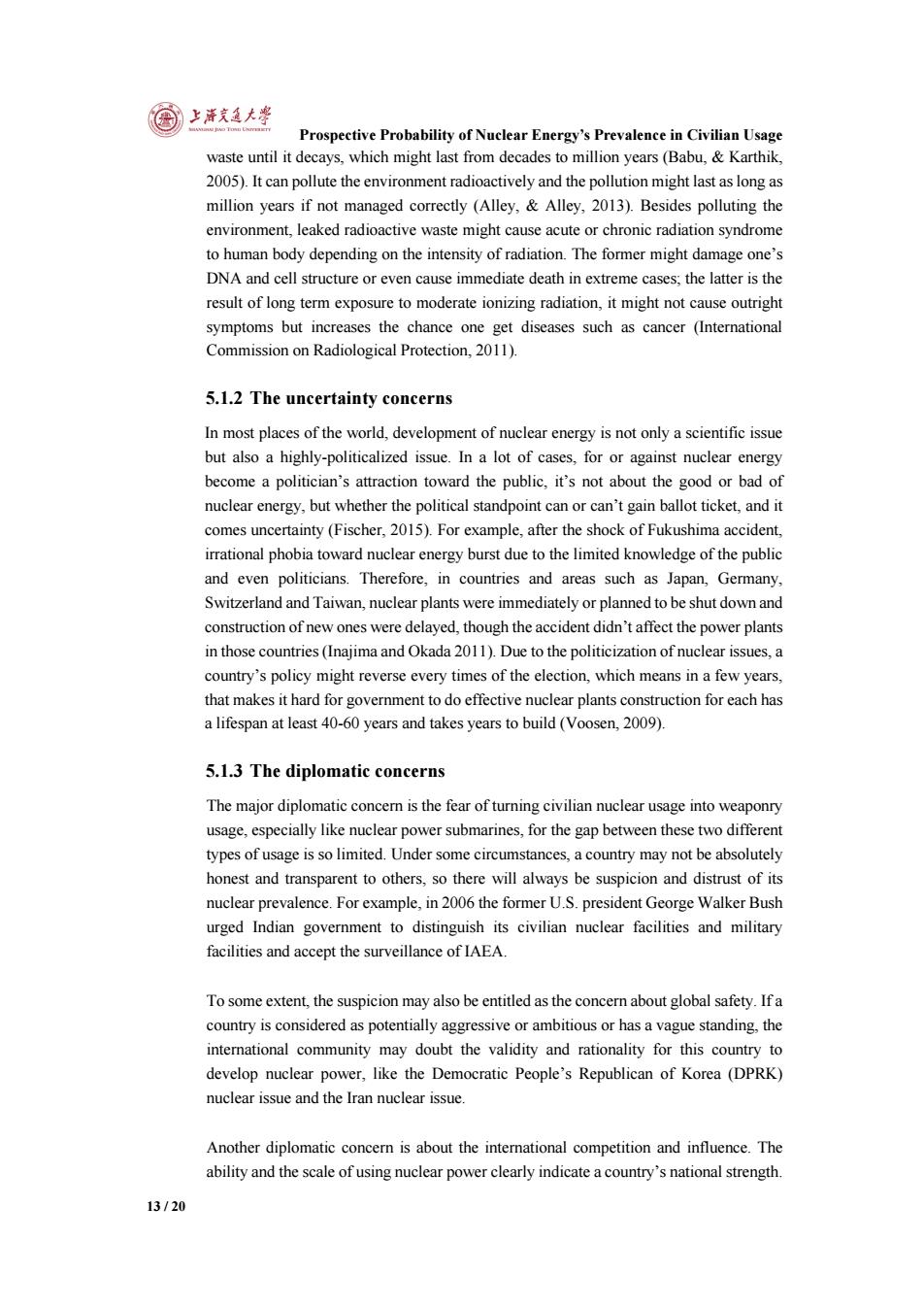正在加载图片...

上充益大粤 Prospective Probability of Nuclear Energy's Prevalence in Civilian Usage waste until it decays,which might last from decades to million years(Babu,Karthik, 2005).It can pollute the environment radioactively and the pollution might last as long as million years if not managed correctly (Alley,Alley,2013).Besides polluting the environment,leaked radioactive waste might cause acute or chronic radiation syndrome to human body depending on the intensity of radiation.The former might damage one's DNA and cell structure or even cause immediate death in extreme cases;the latter is the result of long term exposure to moderate ionizing radiation,it might not cause outright symptoms but increases the chance one get diseases such as cancer (International Commission on Radiological Protection,2011). 5.1.2 The uncertainty concerns In most places of the world,development of nuclear energy is not only a scientific issue but also a highly-politicalized issue.In a lot of cases,for or against nuclear energy become a politician's attraction toward the public,it's not about the good or bad of nuclear energy,but whether the political standpoint can or can't gain ballot ticket,and it comes uncertainty (Fischer,2015).For example,after the shock of Fukushima accident, irrational phobia toward nuclear energy burst due to the limited knowledge of the public and even politicians.Therefore,in countries and areas such as Japan,Germany, Switzerland and Taiwan,nuclear plants were immediately or planned to be shut down and construction of new ones were delayed,though the accident didn't affect the power plants in those countries(Inajima and Okada 2011).Due to the politicization of nuclear issues,a country's policy might reverse every times of the election,which means in a few years, that makes it hard for government to do effective nuclear plants construction for each has a lifespan at least 40-60 years and takes years to build (Voosen,2009). 5.1.3 The diplomatic concerns The major diplomatic concern is the fear of turning civilian nuclear usage into weaponry usage,especially like nuclear power submarines,for the gap between these two different types of usage is so limited.Under some circumstances,a country may not be absolutely honest and transparent to others,so there will always be suspicion and distrust of its nuclear prevalence.For example,in 2006 the former U.S.president George Walker Bush urged Indian government to distinguish its civilian nuclear facilities and military facilities and accept the surveillance of IAEA. To some extent,the suspicion may also be entitled as the concern about global safety.If a country is considered as potentially aggressive or ambitious or has a vague standing,the international community may doubt the validity and rationality for this country to develop nuclear power,like the Democratic People's Republican of Korea(DPRK) nuclear issue and the Iran nuclear issue. Another diplomatic concern is about the international competition and influence.The ability and the scale of using nuclear power clearly indicate a country's national strength. 13/20Prospective Probability of Nuclear Energy’s Prevalence in Civilian Usage 13 / 20 waste until it decays, which might last from decades to million years (Babu, & Karthik, 2005). It can pollute the environment radioactively and the pollution might last as long as million years if not managed correctly (Alley, & Alley, 2013). Besides polluting the environment, leaked radioactive waste might cause acute or chronic radiation syndrome to human body depending on the intensity of radiation. The former might damage one’s DNA and cell structure or even cause immediate death in extreme cases; the latter is the result of long term exposure to moderate ionizing radiation, it might not cause outright symptoms but increases the chance one get diseases such as cancer (International Commission on Radiological Protection, 2011). 5.1.2 The uncertainty concerns In most places of the world, development of nuclear energy is not only a scientific issue but also a highly-politicalized issue. In a lot of cases, for or against nuclear energy become a politician’s attraction toward the public, it’s not about the good or bad of nuclear energy, but whether the political standpoint can or can’t gain ballot ticket, and it comes uncertainty (Fischer, 2015). For example, after the shock of Fukushima accident, irrational phobia toward nuclear energy burst due to the limited knowledge of the public and even politicians. Therefore, in countries and areas such as Japan, Germany, Switzerland and Taiwan, nuclear plants were immediately or planned to be shut down and construction of new ones were delayed, though the accident didn’t affect the power plants in those countries (Inajima and Okada 2011). Due to the politicization of nuclear issues, a country’s policy might reverse every times of the election, which means in a few years, that makes it hard for government to do effective nuclear plants construction for each has a lifespan at least 40-60 years and takes years to build (Voosen, 2009). 5.1.3 The diplomatic concerns The major diplomatic concern is the fear of turning civilian nuclear usage into weaponry usage, especially like nuclear power submarines, for the gap between these two different types of usage is so limited. Under some circumstances, a country may not be absolutely honest and transparent to others, so there will always be suspicion and distrust of its nuclear prevalence. For example, in 2006 the former U.S. president George Walker Bush urged Indian government to distinguish its civilian nuclear facilities and military facilities and accept the surveillance of IAEA. To some extent, the suspicion may also be entitled as the concern about global safety. If a country is considered as potentially aggressive or ambitious or has a vague standing, the international community may doubt the validity and rationality for this country to develop nuclear power, like the Democratic People’s Republican of Korea (DPRK) nuclear issue and the Iran nuclear issue. Another diplomatic concern is about the international competition and influence. The ability and the scale of using nuclear power clearly indicate a country’s national strength